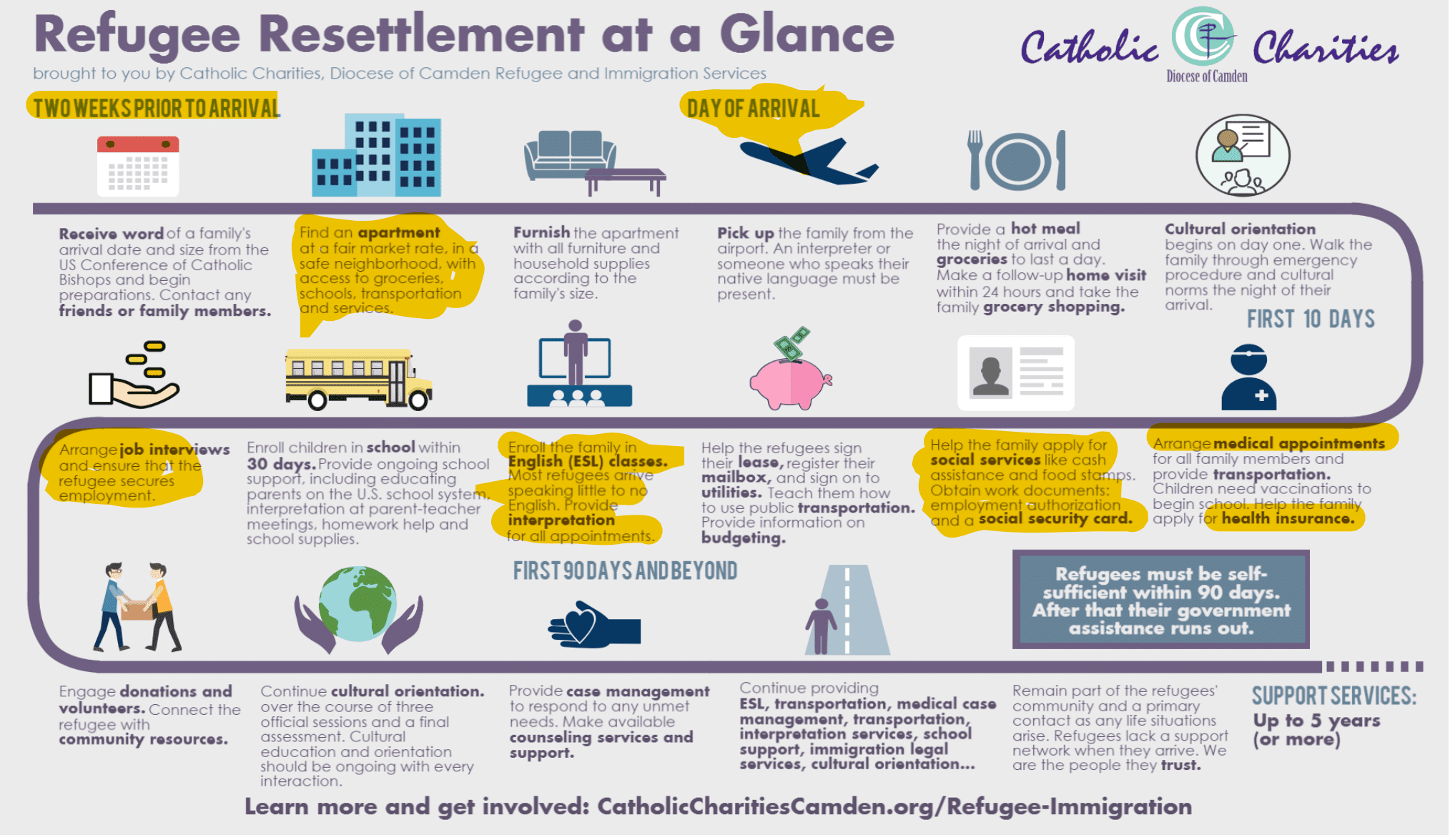Refugee Resettlement: A Brief Overview and How Afghan Newcomers are Different
The federal Refugee Resettlement Act of 1980 established the structure and process for refugee resettlement in the United States that still exists today. A refugee or an asylee is someone who has fled their country of origin because they were persecuted for one of five reasons:
- Political beliefs
- Religion
- Nationality
- Ethnicity
- Belonging to a particular social group
Below is an infographic that explains what happens and how the refugee resettlement process works in the U.S. This process happens here only after a refugee has been vetted overseas and approved for travel to their ultimate destination – the city or town where they will be resettled.
In looking at this infographic, note all the areas that have been highlighted in yellow. These areas are the parts of resettlement that are different, and extraordinarily challenging, with respect to the Afghan families that we are trying to welcome now.
First, because of the crisis in Afghanistan, we are not receiving two weeks’ notice of arrivals. We are receiving emails only a few hours before the families arrive. This means that we do not have time to find affordable housing before the family arrives. We need money to put arriving Afghans in hotels or Airbnbs for ten days to two weeks while we find affordable housing.
Second, while all refugees and humanitarian parolees are provided with $1225 per person in federal monies when they arrive, this money, which has to support all of their needs including housing, food and clothing, does not go very far. Due to the pandemic, housing costs in Philadelphia have skyrocketed. We need money or landlords to help subsidize the housing that we find for incoming Afghans for the first three to six months that they are here. Landlords who might be interested in providing affordable housing to incoming Afghans can learn about doing so by contacting our Community Engagement Specialist, Anneke Kat at community@hiaspa.org.
Third, while airport pick-ups are a regular – and favorite – part of HIAS PA resettlement, because of the crisis, as already indicated, we will be getting only a few hours notice before we will need to get to the airport to pick-up the newcomers. Normally, we would rent a car or a van in order to do this but because of the pandemic, we have had increasing difficulty obtaining a car or van on short notice. We need volunteers with cars, willing to be contacted regarding an airport pick-up only a few hours before we have to be at the airport.
Fourth, while we have a small employment program that assists refugees and asylees in finding work, we don’t have the capacity to serve several dozens of refugees and asylees at one time. We need funding to expand our employment program quickly and we need employers interested in working with our clients to contact us regarding job opportunities. The opportunities, ideally, should include non-skilled opportunities for those with limited English proficiency as well as skilled employment for those who speak English well and are educated.
Fifth, we have an education program that provides English as a second language training but our capacity is not large enough to teach a sudden group of fifty or sixty students. We collaborate with many ESL providers across the city and therefore can refer many newcomers. But referring and teaching takes time. We need funding to increase our capacity to enroll our newcomers in ESL classes across the city as needed.
Finally, while refugees come in with legal status, humanitarian parolees have just an entry visa that allows them to enter the U.S. and remain here for 24 months without getting deported. Now that they are here, they need to file for asylum. The Federal government has provided some funding to permit parolees to apply for asylum but it is insufficient. We need money to increase our capacity to file for asylum on behalf of these newcomers and to help them continue with their legal journey which requires filing for permanent resident status after they receive asylum and naturalization after they have been permanent residents for five years. We also need to be able to provide legal representation to help these newcomers petition for their families who remain behind in Afghanistan, terrified of what will happen to them.



